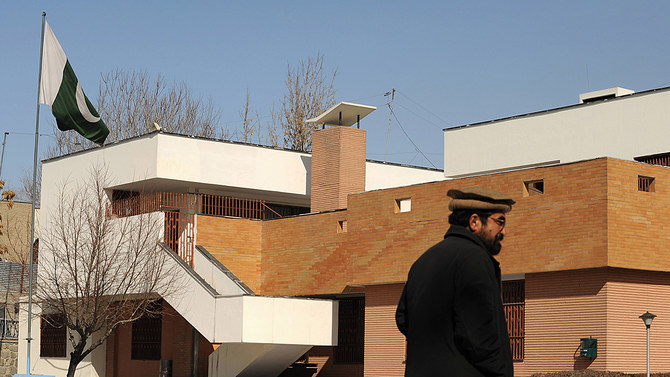KARACHI: The Pakistan mission in Kabul will resume full consular services on Monday after assurances from Afghan officials that a group of criminals operating outside the embassy would be ‘busted,’ officials said.
On Sunday, a Pakistan embassy press release said it was suspending most visa services for Afghan men, except for the elderly and sick, until the government took action against a gang discovered on Saturday which had extorted money from hundreds of visa applicants under the guise of embassy directives.
“After assurances given by Afghan ministry of foreign affairs, the embassy of Pakistan will resume full consular services from tomorrow (Monday),” Adeel Khan, a Pakistan embassy official based in Kabul, told Arab News but declined to comment further.

Photograph of a fraudulent registration list prepared by gang members operating outside the Pakistan embassy on Saturday, July 28, 2019. Close to 600 people were told they would get priority access to the consular section, and charged as much as $62.50. (Photos by Pakistan embassy)
According to an estimate released by embassy officials, the Pakistan embassy in Kabul receives a huge number of applicants daily, around 1,500, and operates its visa services from six counters.
On Sunday, the embassy closed four of those general counters, with only women, the elderly, the sick, and businessmen allowed to apply for Pakistani visas.
A well-informed official in Pakistan’s foreign office in Islamabad, who declined to be named because he was not authorized to speak to the media, said that a Pakistan embassy official accompanied by SSG guards encountered close to 15 men operating outside the consular section on Saturday evening.
The men introduced themselves as “public workers,” but visa applicants said they were charging varying amounts of money in exchange for a token to get consular access to the Pakistani embassy on Sunday.
The money amount varied by ‘priority,’ the gang members told the applicants, with more money paid for quicker access to consular services. The highest amount fraudulently charged was 5000 Afghanis, or $62.50, to applicants in the fake ‘high priority’ lists, according to the foreign office official. It is estimated that on Saturday, the gang had already issued 600 tokens to the visa applicants for Sunday.

In this photo taken by a Pakistan embassy official, the alleged gang of criminals stand together in armbands, armed with sticks outside Pakistan’s embassy in Kabul on Saturday, July 27, 2019. (Photo provided by embassy)
Earlier, an embassy handout said the Afghan foreign affairs ministry had assured Pakistan’s ambassador to Kabul that “the gang operating outside the Embassy will be immediately busted, full inquiry will be conducted and necessary measures will be put in place to prevent such criminals from operating near and about the embassy premises.”
The foreign office source also said the Pakistan embassy received frequent allegations of corruption against the embassy, particularly through the Prime Minister’s citizen portal. But the embassy reiterated that it does not charge any fee for a visit visa and that all visa applicants are tended to on a first-come-first-serve basis.












